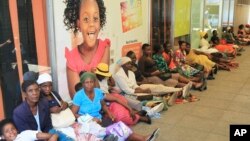In Zimbabwe's capital, a man fills two drums with gasoline at a station that still accepts electronic payments in a country where many vendors demand cash, a sign of the economy's vulnerability.
"I have to stock up. There won't be any fuel by the time we reach Christmas," said Fadzai Radaira, the buyer at the fuel station in Harare.
While the Zimbabwean government has sought to allay fears of fuel shortages, saying the country has enough stocks to run until January, longer lines are beginning to form at some stations and some facilities are intermittently running out of diesel. Some stations offer discounts for motorists who pay in cash as a sense of desperation deepens in Zimbabwe, where fears of economic chaos and shortages on par with fallout from the hyperinflation of 500 billion percent in 2008 are growing.
Compounding the uncertainty is the speculation over the health and longevity of President Robert Mugabe, whose every public appearance is now scrutinized for signs of physical weakness, mental confusion or exhaustion. While Mugabe, who turns 93 in February, has looked shaky at times, he maintains a busy schedule of international travel, visiting Morocco this month for a climate conference, traveling this week to Equatorial Guinea for another meeting and often flying to Asia for reported medical treatments.
Even as Zimbabwe's economy implodes and dissent rises, police are keeping a lid on a fractured opposition that does not appear to be prepared to mount an effective challenge to Mugabe ahead of 2018 elections. Authorities banned a protest planned for this week, though organizers said they have rescheduled the demonstration for Nov. 30.
The immediate priority for many Zimbabweans is survival. In supermarkets, some basic goods such as cooking oil are now only sold on a cash basis as the country prepares for the introduction of a local currency: bond notes. Since 2009 the country has been operating on the U.S. dollar and other foreign currencies and many fear that the return to a Zimbabwean currency will set off a new round of hyperinflation.
Zimbabwe's central bank has gone on a publicity blitz to promote the bond notes to a skeptical public; billboards promote one bond note as having the same value as one U.S. dollar. That assurance has only seemed to prompt more worries, leading Finance Minister Patrick Chinamasa to appeal for confidence.
"It is important as a nation that we build confidence in what the government is doing, including the introduction of bond notes," he said in parliament Wednesday after lawmakers questioned the prudence of issuing the new currency.
Unlike in the past, fuel importers now have to ask for permission from the central bank for funds to buy fuel. Running out of cash, the central bank has drawn up a priority list, where some imports are banned or restricted to save foreign currency. So even businesses or individuals who have U.S. dollars in local bank accounts cannot readily make payments to foreign suppliers.
Delays by the reserve bank in settling such foreign payments have resulted in some businesses complaining that foreign suppliers are holding on to commodities.
On the political front, despite a simmering succession battle within its ranks, the ruling ZANU-PF party says it wants Mugabe, in power since 1980, to run in the 2018 election. Provincial executives have been lining up to endorse his candidacy ahead of the party's annual conference scheduled for Dec 13-17.
Mugabe previously said he wants to rule for life, expressing his desire to live until he is 100 years old. Last weekend, he said he was ready to retire if asked to do so by his supporters and admitted that some in his party want him off the scene.
"Some are busy plotting succession in the party, they say: `When will this old man die? He is refusing to die.' Why should I die when God hasn't called me yet?" he said in the local Shona language during an address to participants of the 1970s struggle against white minority rule. "If I am to retire, let me retire properly."




